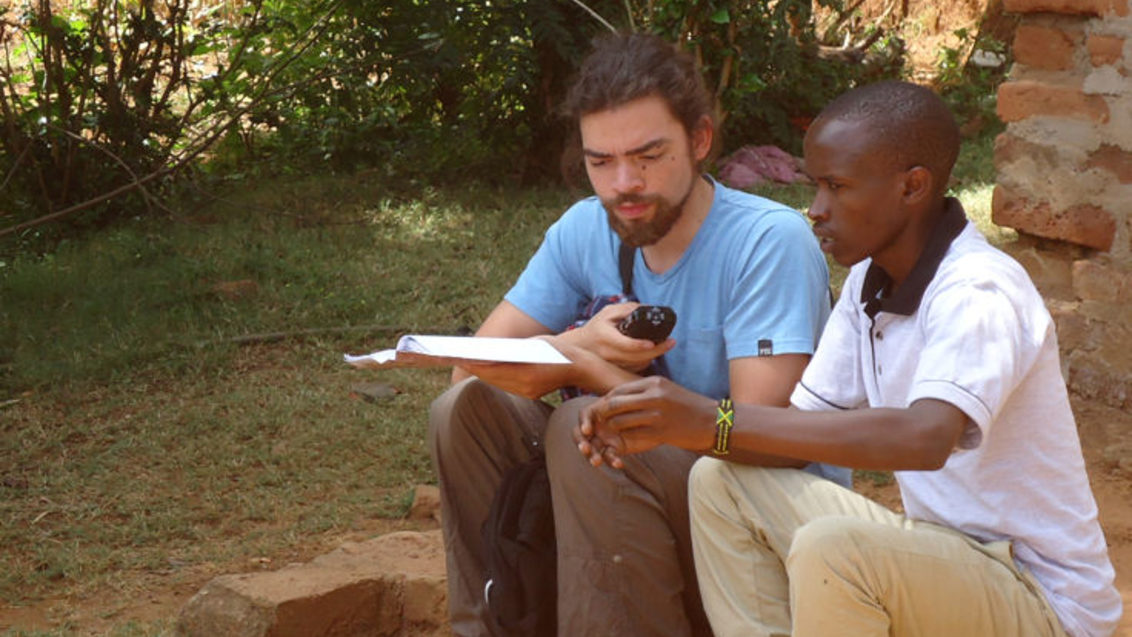Sometimes, it all runs like clockwork

Our Foundation and partners are helping local radio stations in Kenya to establish agricultural advice programs*. Fabian Oswald, studying Science Communications in Germany, has chosen this topic for his Master’s thesis. He recently investigated the knowledge exchange between three stations, their listeners and advisors.
“Everybody warned me in advance: This was research I couldn’t plan down to the last detail. (We Germans have a reputation for wanting to do that!). Something, the warners said, would always take an unexpected turn. The only access road would be flooded. A crucial interview partner would get called away. Every day would bring a new surprise.
Perhaps not the ideal basis for meeting my submission deadline, I could have reflected. But then I arrive in Kenya and start my interviews. And the only surprise was that there wasn’t one: Everything goes exactly to plan. That’s quite a relief, because I’d been preparing for a long time.
In mid-2017, pretty well precisely a year before I reach Nairobi, GFAR runs a webinar on “Farm Radio, Community Radio & Participatory Radio“. At the time, I’m writing an essay on how Bertold Brecht‘s theories about radio (s. below) relate to modern Farm Radio. The webinar sounds like a perfect oppportunity to dive in deeper.
Isn't farm radio on anyone’s curriculum?
Something puzzles me, however. I grew up in Kenya and the Ivory Coast, the son of a biologist and an agricultural scientist. My Bachelor’s is in Audiovisual Media, and now I’m studying Science Communications. Yet only a few weeks ago, I heard about Farm Radio for the first time in my life. And about the major role that various audiovisual media now play in agricultural development.
Why I wonder, is the topic not better known? My essay on Farm Radio comes as quite a surprise at university, too. So I decide to pursue the subject further. In the webinar, I say I’m keen to write my thesis on it. Minutes later a message pops up in the Chat: “Congratulations on your topic choice“, it says: “Please get in touch“.
250 km away on the other end is the Syngenta Foundation. An employee there is partnering with radio training organization Kilimo Media International and is keen on external assessment of the joint initiative. Bingo for me – also for personal reasons: Teaming up for my Master’s will take me back to Kenya for the first time since childhood.
So far, so easy. But finding the precise academic angle turns out to be tricky. The Syngenta Foundation provides advice and links me up with Kilimo Media. But despite all their guidance, I’m still not quite sure what awaits me. How does the Kenyan radio system work in practice? Whom do I really need to interview? How realistic are my plans on the ground? And then there are all those warnings about expecting the unexpected...!
Talking with Kilimo Media and university mentors at least help me settle on a question. As a Science Communicator, I’m interested in how information flows. Will it be straight down the line from A to B? What about radio dialogue? To analyze this topic, I prepare questions for radio staff, smallholders and agricultural extension officers. The last few days get a bit unacademically hectic. And then suddenly I’m at Nairobi Airport. The ATM greets me by swallowing my credit card. But I soon get it back, and the next three weeks run without a hitch.
With Kilimo Media I visit Masarbit, way up north, as well as Kitui and Kajiado, day-trips from Nairobi. I do lots of interviews and record Listener Group sessions for later transcription. There are no flooded roads (Kenya’s heaviest rain for years slackens soon before I arrive), no missing interviewees, not even an unpredictable event. Back in Germany, it’s time to do the write-up. And to reflect whether Farm Radio is one route to the happy possibility Bertold Brecht had imagined in the early 20th century:
“Radio could be the most wonderful communication apparatus of public life, a giant piping system […], if only it would receive as well as transmit – in other words, if it let listeners not only listen, but also speak, and if instead of isolating, connected them. Radio should move beyond mere delivery, and organize its audience as suppliers.“
--------------------------------------------
This article is based on Fabian Oswald’s German original. The Brecht quote comes from Schriften zu Literatur und Kunst, Vol 1. (Translation by Syngenta Foundation 2018).
*Our radio extension page provides further information.
Fabian Oswald‘s Master’s thesis is available here. He has also provided a short preview of the findings. (The choice of photo and other advice came from Helena Berlin Linhares, a school pupil visiting us for Switzerland's "Future Day").
Die deutsche Fassung von Fabians Vorschau finden Sie hier. (Danke für die Hilfe an Schülerin Helena, die uns beim Schweizer Zukunftstag besucht hat!)
Some of the blog entries at the bottom of our Kenya page describe joint visits to radio stations and listener groups.
A Swiss Master’s student has examined the impact of our earlier work with smallholders and McDonalds in Peru.
Other students have also published work connected to our Foundation. Recent examples include Julia Stefanovic’s 2017 paper on climate change and smallholders in Kenya, and Wenjia Wang and colleagues writing about food safety in China.
